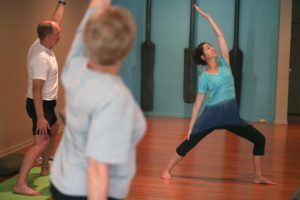Improve the Symptoms of Parkinson’s Disease with Yoga
By John M. de Castro, Ph.D.
“While there is no evidence that regular yoga practice has an effect on the systems in the brain that are related to Parkinson’s disease, patients report improvements in their quality of life.” – Lynn Burgess
Parkinson’s Disease (PD) is an incurable progressive degenerative disease of the central nervous system. The condition is caused by the death of nerve cells in the brain that produce the neurotransmitter dopamine. There are around seven million people worldwide and one million people in the U.S. living with PD and about 60,000 people are diagnosed with PD every year. PD is associated with aging as the vast majority of patients are diagnosed after age 50. In fact, it has been speculated that everyone would eventually develop PD if they lived long enough.
Parkinson’s Disease’s (PD) physical symptoms include resting tremor, slow movements, muscle rigidity, problems with posture and balance, loss of automatic movements, and slurring of speech. PD itself is not fatal but is often associated with related complications which can reduce life expectancy, such as falls, choking, and cardiovascular problems. Parkinson’s Disease (PD) also has psychological effects, especially cognitive decline, anxiety, and depression. All of these symptoms result in a marked reduction in the quality of life.
There are no cures for Parkinson’s Disease or even treatments to slow its progression. There are only treatments that can produce symptomatic relief. So, there is a need to discover new and different treatments. Mindfulness training has been found to improve the psychological symptoms and the quality of life with PD patients. The slow prescribed movements of Tai Chi and Qigong have been shown to improve the symptoms of Parkinson’s Disease. This suggests that other mindful physical exercises like yoga practice might also be effective.
In today’s Research News article “Functional Improvements in Parkinson’s Disease Following a Randomized Trial of Yoga.” (See summary below or view the full text of the study at: https://www.ncbi.nlm.nih.gov/pmc/articles/PMC6009016/ ), Van Puymbroeck and colleagues recruited patients with Parkinson’s Disease and also reported a substantial fear of falling. They were randomly assigned to receive either an 8-week yoga practice or to a wait list control condition. Yoga practice met twice weekly and included postures, meditation, and breathing exercises. They were measured before and after training for Parkinson’s Disease symptoms, Parkinson’s Disease quality of life, balance control, functional gait, and freezing gait. Freezing gait is common in Parkinson’s Disease and is “a brief, episodic absence or marked reduction of forward progression of the feet despite the intention to walk.”
They found that in comparison to baseline and the wait-list group, the yoga group had significant improvements in functional gait, Parkinson’s Disease motor symptoms, freezing gait, and balance control, all with moderate effect sizes. Hence yoga practice produced significant improvements in the motor and balance ability of patients with Parkinson’s Disease. This would predict that yoga practice would reduce falls and improve the longevity of PD patients.
It should be noted that the control condition did not contain any active components. This leaves open the possibility of contamination by placebo effects and biases. Future research should employ an active control condition such as aerobic exercise. Nevertheless, the results are very encouraging that yoga practice may well be highly beneficial for patients with Parkinson’s Disease.
So, improve the symptoms of Parkinson’s disease with yoga.
“Several recent studies have suggested that yoga may offer significant relief to people with Parkinson’s disease. . . .yoga not only improved psychological well-being, it also had an effect on the mobility problems experienced by many patients.” – Sarah Alender
CMCS – Center for Mindfulness and Contemplative Studies
This and other Contemplative Studies posts are also available on Google+ https://plus.google.com/106784388191201299496/posts and on Twitter @MindfulResearch
Study Summary
Van Puymbroeck, M., Walter, A., Hawkins, B. L., Sharp, J. L., Woschkolup, K., Urrea-Mendoza, E., … Schmid, A. A. (2018). Functional Improvements in Parkinson’s Disease Following a Randomized Trial of Yoga. Evidence-Based Complementary and Alternative Medicine : eCAM, 2018, 8516351. http://doi.org/10.1155/2018/8516351
Abstract
Individuals with Parkinson’s Disease (PD) experience significant limitations in motor function, functional gait, postural stability, and balance. These limitations often lead to higher incidences of falls, which have significant complications for individuals with PD. Yoga may improve these functional deficits in individuals with PD. The objective of this study was to determine changes in motor function, functional gait, postural stability, and balance control for community dwelling individuals with PD. This randomized, wait-list controlled pilot study examined the influence of an 8-week yoga intervention for people with PD who met the following inclusion criteria: endorsing a fear of falling, being able to speak English, scoring 4/6 on the minimental state exam, and being willing to attend the intervention twice weekly for 8-weeks. Participants in the yoga group (n=15) experienced improvements in motor function, postural stability, functional gait, and freezing gait, as well as reductions in fall risk. Participants in the wait-list control (n=12) also significantly improved in postural stability, although their fall risk was not reduced. Individuals in the yoga group significantly reduced their fall risk. An 8-week yoga intervention may reduce fall risk and improve postural stability, and functional and freezing gait in individuals with PD.
https://www.ncbi.nlm.nih.gov/pmc/articles/PMC6009016/
